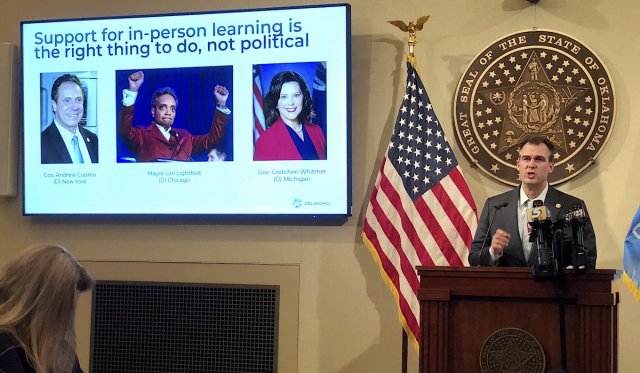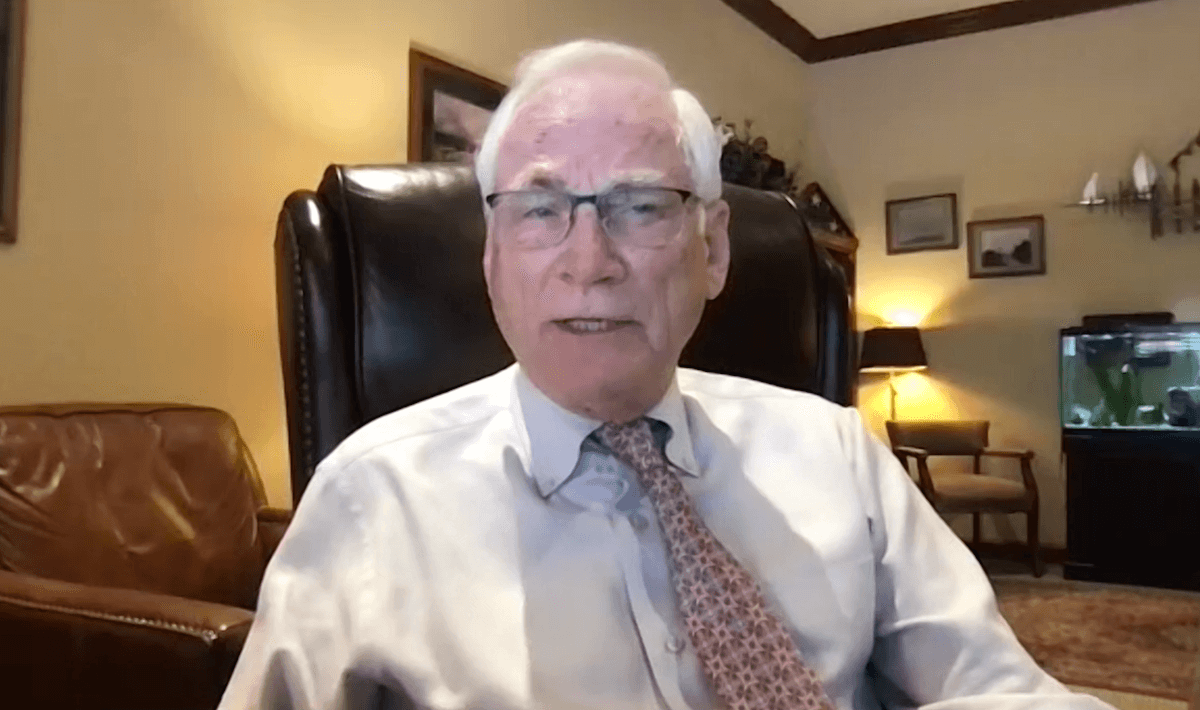
Oklahoma school districts will receive more COVID-19 tests, more personal protective equipment and a new incentive to enforce mask wearing on school sites, according to state leaders.
Citing various studies from around the country, Oklahoma Gov. Kevin Stitt, Commissioner of Health Dr. Lance Frye and Secretary of Education Ryan Walters announced four new efforts this afternoon aimed at encouraging school districts to return to in-person instruction:
- increased delivery of COVID-19 tests to school districts
- increased delivery of PPE to school districts
- an anticipated start to vaccination of teachers age 65+ statewide this week
- a new Oklahoma State Department of Health policy that asymptomatic students exposed to someone positive for COVID-19 do not have to quarantine if their school is enforcing a masking policy and other safety protocols like social distancing.
“Moving forward, schools that enforce the use of masks will not have to quarantine potential exposures unless they are showing symptoms,” Stitt said. “Requiring students and staff to quarantine when they are all wearing masks (…) is counterproductive.”
Overall, Stitt, Frye and Walters again emphasized their desire for all schools to offer an option for in-person instruction. Local school boards are tasked with making that decision.
“The long-term impact of our students going another semester without [in-person education] would be catastrophic academically, emotionally and physically,” Walters said. “It’s very important to make the distinction that there are some students who are successful in virtual options and like that option. We are not talking about taking away that option.”
But Walters and Stitt said many students are not thriving in distance learning. To make his point, the governor referenced a statistic from Oklahoma City Public Schools. Among OKCPS high school students, 66 percent more students have an “F” grade in at least one class currently as compared to the same time last year.
“These kids are struggling, and it’s not their fault,” Stitt said. “They need to be in their classrooms. (…) Refusing to offer in-person school is jeopardizing our kids’ education, it’s jeopardizing our teachers’ careers, and it’s jeopardizing the state of Oklahoma.”
Late Tuesday, OKCPS Superintendent Sean McDaniel released a statement contradicting the data Stitt referenced.
“In his remarks, the governor attempted to characterize the current academic performance at OKCPS high schools. Unfortunately, the data he used was out of date, wildly inaccurate and very misleading,” McDaniel said. “Like many districts, we have gotten better at remote learning while moving through the pandemic, and we continue to make great strides. Thanks to the hard work of our teachers, staff and certainly our students, OKCPS has seen marked improvement since our first few weeks of school, which is what the data he used today represented. It is unfortunate that in order to make his point — one that I substantively agree with — the governor chose to misrepresent OKCPS and cast our kids and our teachers in a negative light.”
Frye: ‘Public health is about balance’
While Stitt continues to push for school districts to offer in-person learning options, he has opposed a statewide school mask mandate for months, reiterating Tuesday that “it’s not about magic words, it’s about compliance.”
“I believe more school districts — even if they don’t have a mandate — they will do it now that they don’t have to quarantine,” he said.
Frye, a physician, said that “when safety protocols are followed consistently” schools are some of the “safest places for our students.”
He added that not having students in school can affect their health tremendously.
“As a medical professional, I can tell you that public health is about balance,” Frye said. “Our students’ mental, physical and social development are also important concerns to consider.”
Psychiatrist warns about pandemic stressers

One hour before Frye made his statement, Dr. Art Rousseau spoke to media via Zoom as part of the Healthier Oklahoma Coalition.
A psychiatrist who has survived COVID-19 himself, Rousseau warned generally about the pandemic’s effects on people’s mental health, noting that symptoms of anxiety, depression and post-traumatic stress disorder may appear for those infected with the novel coronavirus.
“I would recommend that you reach out to your health care provider and inform them of your symptoms,” Rousseau said.
He added that those already dealing with those mental health conditions — as well as bi-polar disorder or schizophrenia — could see an increase or reoccurrence of symptoms.
“If you have a pre-existing mental disorder (…) you may need to adjust your treatment based on your responses to the stress of the pandemic,” he said.
Stitt: ‘Disparities can get worse’
In his remarks, Stitt hinted at concern about children’s mental health, saying closed school buildings mean less access to social and support services for kids.
“It widens achievement gaps that already exist across income levels and races,” Stitt said. “Back in July, I warned that these disparities can get worse.”
As a result, Stitt said he wants schools to offer in-person options so that families have choices.
“Decisions about school should be made by parents at a dinner table, not by people at a union hall with their own agenda,” Stitt said.
Asked what he meant by that, Stitt did not speak about teacher unions further.
“When all the dust settles and COVID is behind us, I want everybody to know that kids need to be in school. I want kids in school,” Stitt said. “We can spin it however you want to spin it. Whoever is not opening up schools, not giving kids the option for in-person learning — kids need to be in school. The stat speaks for itself: (at) Tulsa Public Schools, a high school student has not been in class for 305 days. So you can write what you want about it. I don’t know exactly what is happening. I’m trying to be transparent with the data.”
Currently, Tulsa Public Schools is scheduled to bring pre-K through third grades back to in-person instruction on Jan. 25 followed by fourth through 12th grades Feb. 1.
Oklahoma City Public Schools is set to bring pre-K through fourth grades, special education and alternative education students back to traditional classroom learning on Jan. 19. OKCPS will wait until the end of the month to make a decision on whether they will move forward with returning fifth through 12th grades to in-person learning on Feb. 1. But OKCPS has announced such a return before, having one day of in-person learning for older students in the fall before returning to online-only instruction.
Meanwhile, Jenks Public Schools began bringing students back to in-person learning last week, along with Broken Arrow, Union and Owasso Public Schools.
Hofmeister, others pan announcement
Oklahoma Superintendent of Public Instruction Joy Hofmeister released a statement late Tuesday afternoon expressing displeasure with the governor’s announcement.
“The ramifications of the pandemic on education have been challenging and severe,” she said. “While this option underscores the need for mask requirements in school, I cannot in good conscience support ignoring quarantine guidelines from the CDC and other infectious disease experts. There is no doubt we all want our students and teachers to be safely in the classroom, but COVID is raging in Oklahoma. In-person instruction is critical, and so is mitigating the spread of the virus. They are not mutually exclusive.”
Oklahoma Education Association President Alicia Priest called Stitt’s statements confusing.
“The governor says schools aren’t open, but where are all these schools that aren’t open? Many educators and support professionals have been battling the pandemic while teaching, feeding students, and keeping everyone safe. Burnout is real, and many have been sick. Some have died. Don’t accuse teachers of not trying when they are in the fire right now,” Priest said in a statement. “Time is running out for our kids this school year. The governor needs to stop using his time dividing teachers and parents. His No. 1 priority should be mitigating the spread of the virus — not scapegoating local school boards, pitting parents against teachers, or avoiding responsibility.”
(Update: This article was updated at 4:55 p.m. Tuesday, Jan. 12, to include statements from Hofmeister and Priest. It was updated again at 11 a.m. Wednesday, Jan. 13, to include comment from McDaniel.)





















